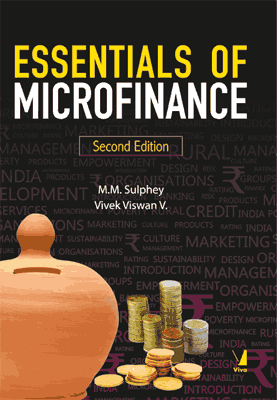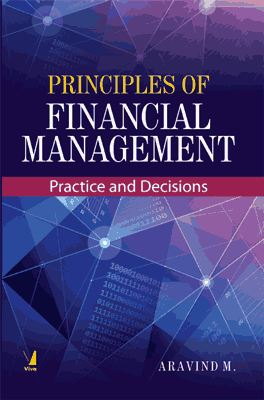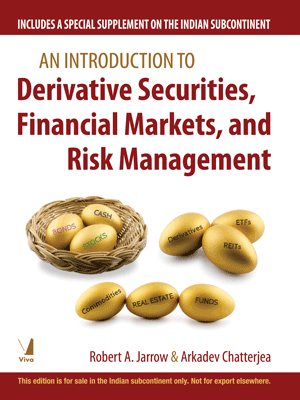Credit and Collection Management
Credit and Collection Management
Collect Your Dues and Overdues Without Losing the Customers
₹805.50 ₹895.00 Save: ₹89.50 (10%)
Go to cartISBN: 9789387925595
Bind: Paperback
Year: 2018
Pages: 500
Size: 5.5 x 8.5 Inch
Publisher: Viva Books Originals
Sales Territory: Worldwide
When you collect your money, you collect your own investment plus a small reward called profit. But when you don't collect, the effort made by whole organization is eroded.
Highlights of the book:
- Do you calculate how much interest per day your company is losing on overdue debtors?
- What oxygen is to body, cash flow is to business.
- How to collect money from B2C, B2B, FMCG, Project, Service and Government departments?
- Provides you with effective credit and collection management system.
- Serves as a ready reference for management, sales, commercial, accounts and collection people.
- Provides a way out for most of the collection problems.
- All about Relationship Management: Commitment, Commitment and Commitment - you commit and get an order, you stand by your commitment and get credibility, above all you stand by your commitment consistently and you start and maintain a relationship.
- No matter how many collection problems you have, it can be summarized into 6 heads:
- Inefficiency in our office;
- Inefficiency in customer's office;
- Funds problem;
- Purposely delay by customers;
- Complaints; and
- Preparation for legal action and how to handle cheque bouncing.
- This book will help you avoid cash crisis.
Target Audience:
Serves as a ready reference for Management, Sales, Commercial, Accounts and Collection People.
Contents:
Foreword and Preamble
Preface
Acknowledgements
What experts say
What they say about our earlier book
What they say about our workshops
Chapter 1. THE CHALLENGE
Turn Mistakes or Losses into Opportunities; Era of Customerising; Categorising a Customer; Understand the decision makers and the power players at customer's office; In the projects you will have to find out who's who; Don’t over-commit; deliver what is promised; An order or a contract is not a political promise; Customer-Oriented follow-up; Practising Credit and Collection Management; Who is a customer? One who pays on time...a mutual respect; Overdue debtors – How much money are you losing per day? Get rid of the dead-beat customers; Make a difference; Three Success Stories: Case I: An Organised Collection Effort, Case II: Cash-flow Slowdown, Case III: An Overdue Situation
Chapter 2. CREDIT AND COLLECTION MANAGEMENT—THE NAME OF THE GAME
Cash Cycle; Working Capital; Advantages of Credit Trading; Credit, Liquidity and Profit; Cost of Credit; Opportunity Cost of Funds; Credit Sells – Receivables; Cost of Servicing Accounts Receivables; The Role of Credit Control Department; Credit Policy; Business Plan; Types of Growth; Types of Credit Policies; Credit Procedures and Credit Policy; Assessing Credit Policy; Credit Manual Preparation; Suggested Contents of a Credit Manual
Chapter 3. THE WINNING TEAM—COLLECTING MONEY IS EVERYBODY'S BUSINESS
Relation with other Departments; Hiring a Credit Manager; The Credit Controller Should be of a Special Brand; Helping a Credit Manager Settle In; Organisation of Credit Control Department; Duties and Responsibilities of Credit Manager; Functions of a Credit and Collection Department; Over Head Budget Follow-up; List of Files and Folders Maintained; Case Study
Chapter 4. TERMS OF PAYMENT—OUR MONEY IN OUR POCKET AT THE AGREED TIME
Terms of Payment; Objectives and Establishment of Terms of Payment; Credit Terms; Time-based Credit vs Cash Discounts; Payment Related to Delivery; Cash Discount; Interest Charges; Advance; Bank Guarantee (BG); Indemnity Bond; Security Deposit/Earnest Money Deposit (EMD); Other Terms of Payment; Inco-terms Decides Landing Price; Understand the Importance of Incoterms/Shipping Terms; Other Commercial Points; Supplier's Performance; The Customer's Point of View
Chapter 5. CREDIT VERIFICATION—WILL THEY PAY? THEY WILL, IF . . .
Credit Ratings: Know Your Potential Customers; GDOC Categorization; ABCD Categorization; Credit Procedure; Documents and Guarantees; Trade and Competitor's Opinion; DGS & D Registration; CRISIL; Credit Visit; Balance Sheet Analysis; Registrar of Companies; Press Reports; Ledger History; The Other Three ‘C’s of Credit; Time Required for Assessing Credit Worthiness; Conclusion: Which Account is Credit-Worthy?; MIRA INFORM – A Credit Verification & International Collection Company; Credit Information Bureau (India) Limited (CIBIL); *Free CIBIL Report, yearly once wef., 01/01/2017 – RBI Directive issued*; The Benefits of a Credit Bureau; Operating Efficiencies; Credit Information Companies (Regulation Act) (CICRA)
Chapter 6. ORDER ACCEPTANCE AND CONTROL—QUALIFYING THE UNDERSTANDING
Risk Category; Improve your Credit Score – Proprietor at Atul Donde and CO; Order (Oral and Written Contracts); Basic Requirements for a Contract; Contract and Cash Traps; Order Referral; Cost of Discount; Public Sector Customer; The Dealer; High Credit or Extended Credit; Constant Monitoring of Credit Accounts; Accounts receivable—Good quality and Poor quality; Good Quality Accounts; Poor Quality Accounts
Chapter 7. THE GAME OF DEBIT AND CREDIT – NOW WITH COMPUTERS
Debtor Accounting; Fundamental Requisites of Good Debtor's Accounting; Receivable Ledger; The Customer Master Files; Statement of Accounts; Age Analysis; Points to Note; Credit Notes (Customer's Debit Notes); Filing
Chapter 8. IN HOW MANY WAYS CAN I COLLECT OUR MONEY?
Methods, Credit Services and Other Modes; Common Methods and Services Available; By Cheque or Demand Draft; Documents through Bank; Letter of Credit (L/C); Checklist for Letters of Credit; IDBI/ICICI Bill Discounting and Rediscounting; Instalment Facilities and Hire-Purchase Schemes; Leasing; Factoring; EDI Factoring and GEDIS Network; Credit Cards; Collection Agencies; Contra Accounts; Consignments Sale; Electronic Data Interchange and Credit Control; Lockbox or Cash Management Product (CMP); Franchising; Bank Channel Financing Schemes; Summarizing Payment Terms; Bad-Debt Cover
Chapter 9. SALES ADMINISTRATION—FIRST THINGS FIRST – TOOLS FOR THE JOB
Collection Programme—Pre-requisites; Design Customer Friendly System; Orders to be Checked and then Acknowledged; Maintaining Up-to-date and Correct Status of Each Order; Order Clearance Chart; Points Check Before Forwarding Invoice; Control of Float; A Check-list with Regard to Bill Passing Procedure; Case Study; About APSEB: From Order to Payment
Chapter 10. COLLECTION PLANNING—THE GAME PLAN
Planning, Organising and Controlling the Collection Activities; Target setting and Collection Planning; Minimum and Maximum Amount Collectable; The Pareto Principle, Organising Collection—The 80/20 Rule; Preparation to Achieve Target and Control of the Operation; The Pareto Principle; Age Analysis; Rules for Collection; Rules for Follow-up; Plan for Overdue Collection; Plan During Cash-Flow Drive; Case Study
Chapter 11. EMPOWER YOURSELF—THE RIGHTS OF THE SUPPLIER
Chapter 12. THE ART OF COLLECTION—COLLECT THE MONEY BUT KEEP THE CUSTOMER
Collection Follow-up; Customer-oriented follow-up is the answer; Personal Follow-up; Tips for Sales Rep; Telephone Follow-up; Ten Commandments for Professional Telephone Collection; Debt Collection Letters; Some Letter-writing Tips; Specimen Letters; Collection—Telegram/Telex/Fax/E-mail; Other Aids; Paying Characteristics; Art of Collection; Dealer/Reseller and Credit Control; Certain Discipline; Handling a Project and Credit-Collection Management
Chapter 13. THE ART OF COLLECTION—OVER DUES ? THE DIFFICULT ONES
Some Basic Principles; Who is a Customer? One Who Pays on Time; What is a Sale?; What is an Order?; When is a Sale Complete?; What is Delivery? What is a Customer?; Customer's Expectations; Inefficiency and Customer Dissatisfaction; Dealing with Complaints; Purposely Delay by Customer Office Procedure; Deliberate Policy; Financial Crisis; Other points to note; Contra Accounts; Complaints Management; Liquidated Damage (LD)
Chapter 14. THE ART OF COLLECTION—THE LEGAL PATH AS LAST RESORT
Before the going Legal Points to Ponder with; Dishonour of Cheques; New cheque rules: 5 things to know; Rules for Taking Legal Action—Dishonour of Cheques; New Amendment under Section 138 of Negotiable Instrument Act; Summary Suits; Suit under the Penal Code; Winding up Petition; Enforcement Procedures; Suing an Overseas Debtor; Micro & Small Enterprises: Refer Taxman
Chapter 15. MANAGEMENT INFORMATION SYSTEM—REPORTS: THE FACTS
Management Information System and Credit Control; Monthly Reporting; Loan from Bank against Accounts Receivable; Aid to Cash-flow; Statement on Held-up/Disputed Payments; Measuring Performance of Credit Control Department; Credit Control Department as a Profit Centre; Cost of Slow Payments, Extended Terms & Incremental Contribution; Accounts Receivable Statistics for Comparison with Industry Standard
Chapter 16. AUDITS—THE LONG ARM OF THE LAW
Accounts Receivables and Statutory Requirements; Internal Audit; Internal Audit for Sales and Trade Receivables; External (Statutory) Audit; Audit Objectives for Sales and Trade Measurables; Income Tax & Accounts Receivables (Debtors); Writing off Bad Debts; Provision for Bad and Doubtful Debts; Collection of Accounts Receivables Previously Written Off
Chapter 17. SERVICE INDUSTRY—...SELLING THE INVISIBLE
Service Marketing; Special Characteristics of Services; Services: Both Productivity and Quality are of Key Importance; Consumer and Commercial Credit; The Various Forms of Consumer Credit; A Few Definitions; The Consumer; The Product; Commercial Credit; Customer Credit; What Credit Does for Consumers; What Credit Does for Retailers and Service Business; What Credit Does for Financial Institutions; Competition in Consumer Credit; Credit Policy; Activities of Consumer Credit Department; Terms of Sale; Setting Credit Limits or Credit Lines; Credit Checks; Pre-credit Sanction Stage; Collection Planning; Collection Problem with Consumer Credit; Follow-up of Debtors; Guidelines; Cost of Credit Operation
APPENDIX I: BANK GUARANTEES—THE AGONY FROM THREE YEARS TO THIRTY YEARS
Controlling/Monitoring of Bank Guarantees
APPENDIX II: HANDLING GOODS-IN-TRANSIT INSURANCE EFFECTIVELY
Transit Insurance—They Will Settle Only If ...; With Regard to Rail/Road/Air Transit Insurance, a Credit Manager Must Understand the Following
APPENDIX III: WHAT IS CREDIT INSURANCE? INSURE SUNDRY DEBTORS
Process Overview; Why Business Credit Shield?; Tailor Made Solutions; Partners in Your Risk
APPENDIX IV: ABBREVIATIONS – THE LONG AND THE SHORT
Bibliography
Can I Help You? – My List of Workshops
About the Author:
Mr. Ajoy K Guha was Executive Director - Business Development of Renoir Consulting and before becoming a management consultant has also served various industries for 40 years. To name few corporates are Arya Communication Ltd. (Motorola), General Electric Althoms Ltd., Aplab Ltd., Bright Brothers Ltd., etc. He has also served in the Middle East.
Started his career at the age of 17, in the year 1972, he has worked in various areas such as finance, commercial, marketing and sales. He has also headed EDP/MIS, HRD and Marketing Department.
A double graduation from University of Mumbai in accounting and business management, he has also done postgraduate diplomas in Internal Auditing, Business Management and Trading (London), International Import Export Management (London), MBA - Finance (London), and diploma in Computer Science.
He is a life member of Bombay Management Association and a fellow of Business Management Association, London. And also a life member of Computer Society of India.
He has co-authored with Dr. Atthreya in a manual titled ?Effective Credit Management?, a first of its kind on Credit and Collection Management for all types of industries in Indian context.
His book Cash Before You Crash coauthored with Dr. Atthreya has appeared on the Business India. Also, compiled manual for ?Costs Reduction Strategies? and ?Commercial Negotiation?.
Mr. Guha is a regular lecturer at Bombay Management Association and Ahmedabad Management Association. He extends consulting on Faster Growth, Re-engineering and Turnaround Process.
Presently Ajoy K Guha is offering inhouse corporate power workshops:
1. Collecting Dues and Overdues - A Step-by-step Approach Without Losing the Customers.
2. Cost Reduction Strategies - Do it Yourself and Speed-up Your Growth.
3. How to Prepare for a Commercial Negotiation - Getting the Best Deal: Sales, Purchase or Contract - Separate Training, etc.
Visit ajoyguha.com or write to ajoyguha@gmail.com







